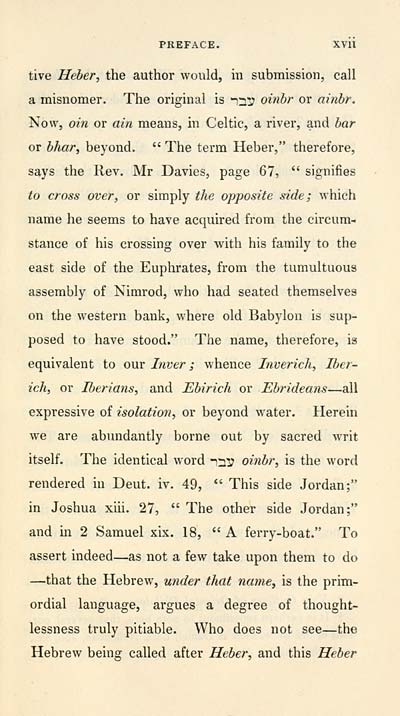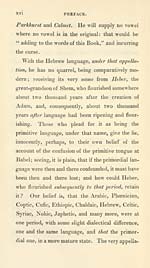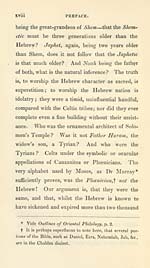Download files
Complete book:
Individual page:
Thumbnail gallery: Grid view | List view

tive Heher, the author would, m submission, call
a misnomer. The original is -1337 oinbr or aiiihr.
Now, oin or ain means, in Celtic, a river, and bar
or bhar, beyond. " The term Heber," therefore,
says the Rev. Mr Davies, page 67, " signifies
to cross over, or simply the opposite side; which
name he seems to have acquired from the circum-
stance of his crossing over with his family to the
east side of the Euphrates, from the tumultuous
assembly of Nimrod, who had seated themselves
on the western bank, where old Babylon is sup-
posed to have stood." The name, therefore, is
equivalent to our Inver ; whence Inverich, Iber-
ich, or Iberians, and Ebirich or Ebrideans — all
expressive of isolation, or beyond water. Herein
we are abundantly borne out by sacred writ
itself. The identical word -q27 oinbr, is the word
rendered in Deut. iv. 49, *' This side Jordan;"
in Joshua xiii. 27, " The other side Jordan;"
and in 2 Samuel xix. 18, "A ferry-boat." To
assert indeed — as not a few take upon them to do
— that the Hebrew, under that name, is the prim-
ordial language, argues a degree of thought-
lessness truly pitiable. Who does not see — the
Hebrew beino^ called after Heber, and this Heber
a misnomer. The original is -1337 oinbr or aiiihr.
Now, oin or ain means, in Celtic, a river, and bar
or bhar, beyond. " The term Heber," therefore,
says the Rev. Mr Davies, page 67, " signifies
to cross over, or simply the opposite side; which
name he seems to have acquired from the circum-
stance of his crossing over with his family to the
east side of the Euphrates, from the tumultuous
assembly of Nimrod, who had seated themselves
on the western bank, where old Babylon is sup-
posed to have stood." The name, therefore, is
equivalent to our Inver ; whence Inverich, Iber-
ich, or Iberians, and Ebirich or Ebrideans — all
expressive of isolation, or beyond water. Herein
we are abundantly borne out by sacred writ
itself. The identical word -q27 oinbr, is the word
rendered in Deut. iv. 49, *' This side Jordan;"
in Joshua xiii. 27, " The other side Jordan;"
and in 2 Samuel xix. 18, "A ferry-boat." To
assert indeed — as not a few take upon them to do
— that the Hebrew, under that name, is the prim-
ordial language, argues a degree of thought-
lessness truly pitiable. Who does not see — the
Hebrew beino^ called after Heber, and this Heber
Set display mode to: Large image | Transcription
Images and transcriptions on this page, including medium image downloads, may be used under the Creative Commons Attribution 4.0 International Licence unless otherwise stated. ![]()
| Early Gaelic Book Collections > Blair Collection > History of the Celtic language > (23) |
|---|
| Permanent URL | https://digital.nls.uk/76178862 |
|---|
| Description | A selection of books from a collection of more than 500 titles, mostly on religious and literary topics. Also includes some material dealing with other Celtic languages and societies. Collection created towards the end of the 19th century by Lady Evelyn Stewart Murray. |
|---|
| Description | Selected items from five 'Special and Named Printed Collections'. Includes books in Gaelic and other Celtic languages, works about the Gaels, their languages, literature, culture and history. |
|---|

